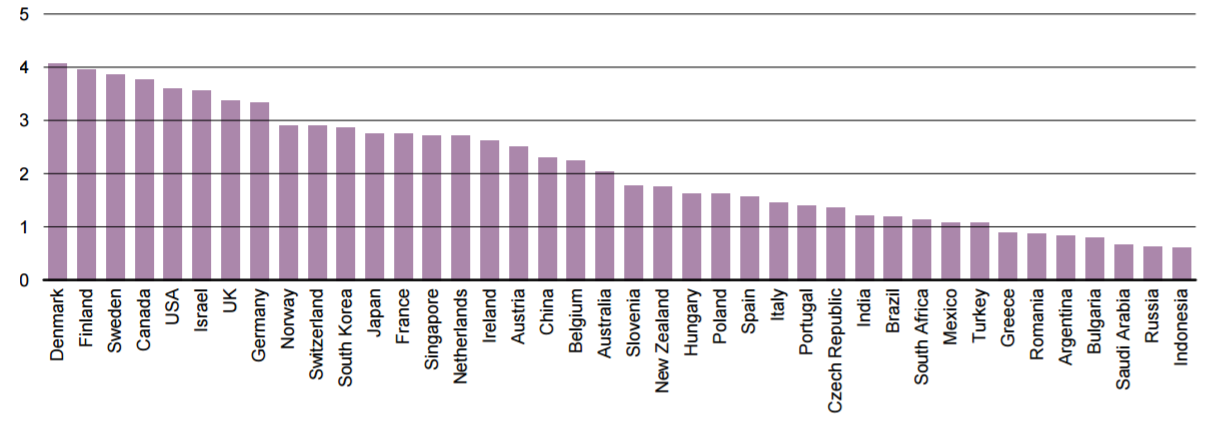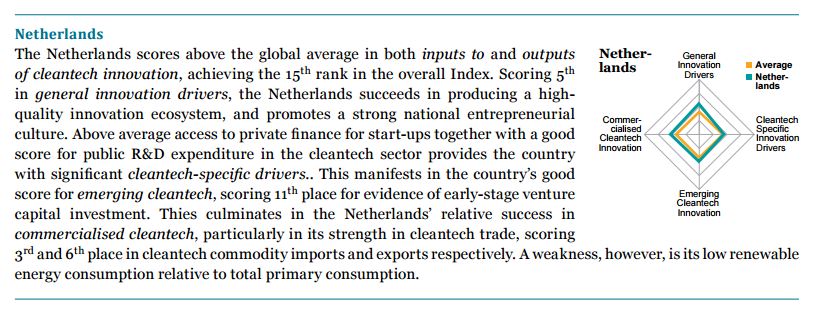The 2017 Global Cleantech Innovation Index (GCII) shows the Nordic region has the strongest cleantech start-up creation leadership for the first time. The region provides the best conditions today for clean technology start-up creation according to the third edition of the Global Cleantech Innovation Index. The report was, released by Cleantech Group and global conservation organisation WWF with support from partners United Nations Industrial Development Organization (UNIDO), Asian Development Bank (ADB), The Swedish Agency for Economic and Regional Growth and the Swedish Energy Agency.
The top three positions are held by Denmark, Finland and Sweden. All three appear to be gearing up for additional growth with increases in the numbers and amount of cleantech funds. The lowest scoring Nordic country is Norway. There are challenges for Norway, but it is also the country with highest cleantech R&D budgets in 2013-15. The world would invest roughly four times more in cleantech R&D if it adopted the same level of cleantech R&D per GDP as Norway.
Poland has the biggest change from the 2014 Index, rising 13 places to 24th. This is mainly due to three notable increases in cleantech-specific drivers. Poland’s public cleantech R&D expenditure now sits at the global average, having been in last place three years ago. The country has also improved as a more attractive destination for renewable energy investments than before and moved up 16 places in measurement of cleantech patent filings.
The study covers 40 countries, including all of the G20. The index demonstrates that countries get ahead if they:
- are able to adapt to the growing demand for renewable energy (at home and abroad);
- are connecting start-ups with multiple channels (e.g. multinational corporates, public procurement) to increase their success rates; and
- are increasing international engagement to spur widespread adoption of clean technologies.
The GCII identifies three country archetypes in the cleantech innovation landscape: the Top Innovation Ecosystem Creators, Start-Up Generators and the Strong Commercialisers:
- The top innovation ecosystem creators are countries that scored very well across the board, but particularly well in both general and cleantech-specific drivers in the 2013-2016 period by providing the underlying parameters, incentives, and necessary support for a thriving cleantech innovation ecosystem. We see Denmark, Sweden and USA having these characteristics in the period researched.
- The cleantech start-up generators are countries that score well in all indicators, but score exceptionally well when it comes to producing patents for new cleantech innovations and venture capital to finance new business. Israel, Finland and Canada are economies that show these characteristics.
- The cleantech commercialisers are countries that are scoring well in all indicators and drivers whilst well above average on market sophistication, size and finance to scale emerging cleantech innovations and create jobs. They have very high cleantech innovation conversion rates, i.e. are efficient in turning inputs to innovation into outputs in the economy. Countries like Germany, Singapore and South Korea display these characteristics.
The GCII also shows there is strong emerging convergence between clean transportation, energy efficiency and renewable energy, last year accounting for two thirds of early-stage venture capital investments, and a similar proportion of green bonds. This emerging trend is crucial to accelerate towards achieving universal energy access by 2030, and facilitate a just transition to a sustainable and fossil fuel-free energy system by 2050.
The report identifies a positive correlation between inputs to innovation and outputs of innovation. Countries that are facilitating investments in innovation, either through public R&D, cleantech-friendly policies, or any other of the inputs measured, tend to also reap benefits. These come in the form of commercialisation of cleantech companies in terms of jobs, exports and growing numbers of publically traded companies showing strong growth in order to reduce environmental pressure.
Richard Youngman, CEO of Cleantech Group (CTG) said; ‘The Global Cleantech Innovation Index has once again shown that to reap the rewards of innovation requires strong support for entrepreneurship and ecosystem building over a sustained period. As part of our work to chart the future, we see this Index as an instructive radar on the relative strength and maturity of innovation ecosystems globally.’
Stefan Henningsson, WWF-Sweden senior advisor on climate, energy & innovation said since the first GCII was published just five years ago, there has been a real shift in momentum from nations, cities, corporates, and investors committing to and taking unprecedented climate action.
‘But we must see a rapid increase in commercialising disruptive innovations from the start-up community for us to be able to reduce greenhouse gas emissions according to what science indicates we need to do. Of course, much more needs to be done in every country and by investors if we are to properly address climate change and achieve a halving of emissions every decade and a fossil fuel free energy system latest by 2050,’ he said.
Manuel Pulgar-Vidal, leader of WWF’s global Climate & Energy Practice said the effort to tackle climate change would take everyone doing everything. ‘For the world to have any chance to keep global warming well below 2°C, it will require a monumental effort on all fronts, and this task will be impossible without a combined and concerted effort to work on improving cleantech deployment innovation. I am really heartened by the positive trends identified in this report, especially the link between the role of government as an enabler and finance and innovation. This bodes well for stronger growth in cleantech innovation in the future.’




